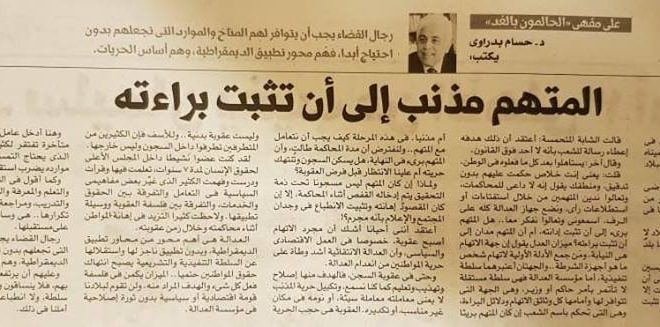The accused is guilty until proven innocent
Hossam Badrawi
The young man said: Why do the accused in public trials in Egypt stand in a cage, which we called the dock, and we do not see this phenomenon in the developed countries?
I said: According to my understanding, the law does not obligate the judge to do so except to protect the accused from another party or from a public who has convicted him before the trial, and I may be wrong in my understanding.
He said: But this has become the norm and I understand it in a country where there are no means of protection for trials, but we are a country where security is in control.
Another young man said: What is the meaning of two presidents of the republic standing in the dock, which we managed to make of glass, and now it is not transferable to sound except through devices and techniques, and they are accused and their guilt has not been proven. Is this not an insult to a high position?
The excited young woman said, “I think this is meant to send a message to the people that no one is above the law.”
Another said: They deserve it after all they did in the country.
I said: I mean, you have finally judged them without scrutiny, and your logic says that there is no need for trials, and come condemn the accused through referendums or opinion polls, and put the entire justice system on the shelf. Listen, let us think together.. Is the accused innocent until proven guilty, or is the accused convicted until proven innocent? The balance of justice says that the point of accusation is the prosecution, and the one who collects the preliminary evidence to accuse a person is the police.. and the two bodies I consider to be an executive authority. As for the institution of justice, it is an independent authority that is not subject to the order of a ruler or a minister. It judges in the name of the people whether the accused is innocent or guilty. At this stage, how should we deal with the accused.. and suppose that the trial period is long, and that the accused is ultimately innocent, does he live in prisons and his freedom is violated, or do we have to wait before imposing the punishment?
And why, if the accused is not imprisoned under investigation, is he put in the cage during the trial, unless the intention is to insult him and establish the impression in the consciousness of society and the media that he is a criminal?!
I think that sometimes I doubt that mere accusation has become a punishment, especially in economic and political work, and that selective justice is more severe on the freedom of citizens than lack of justice.
Even in prison sentences, the aim is to reform, discipline and educate, as we used to hear, and tying up the freedom of the offender does not mean treating him badly, sleeping in an inappropriate place, or disturbing him. Punishment is withholding freedom, not corporal punishment.. Unfortunately, many extremists became radicalized inside prisons, not outside them.
I was an active member within the Supreme Council for Human Rights for 7 years, during which I learned, read, studied and understood a lot that changed some of my political concepts in dealing and the distinction between rights and services, and the distinction between the philosophy of punishment and the means of its application. And I noticed a lot of insulting the citizen during his trial and during the time of his sentence.
Justice is the most important axis of democracy implementation, and without its complete implementation and independence from the executive and legislative authority, the violation of the rights of citizens becomes inevitable.. The balance lies in the philosophy of doing everything and the intended goal. Our country will not have an economic or political nationalism without a reformist revolution in the institution of justice.
Here, I introduce the factor of time, because justice that comes late lacks much of its value, and because a judge who needs to wield the executive authority to increase his resources strikes the independence of the judiciary in a killing.
And as I say in education and I call, I say here, science, learning, knowledge, electronic communication, digital, training, self-review, studying mistakes and preventing their recurrence…are the means of rising nations eager for their future.
The judiciary must have the climate and the resources that make them without need at all. They are the focus of the implementation of democracy, and they are the basis of freedoms.
They must rise to the level of our high expectations of them, so that they do not follow a habit, and are not affected by the pressures of the authority, nor the societal and media impressions.. They are our hope for that.
 Dr. Hossam Badrawi Official Website
Dr. Hossam Badrawi Official Website


